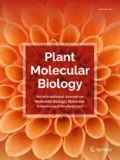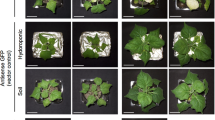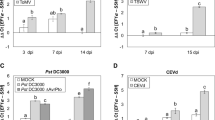Abstract
Proline hydroxylation is a major posttranslational modification of hydroxyproline-rich glycoproteins (HRGPs) that is catalyzed by prolyl 4-hydroxylases (P4Hs). HRGPs such as arabinogalactan proteins (AGPs) and extensios play significant roles on cell wall structure and function and their implication in cell division and expansion has been reported. We used tobacco rattle virus (TRV)-based virus induced gene silencing to investigate the role of three tomato P4Hs, out of ten present in the tomato genome, in growth and development. Eight-days old tomato seedlings were infected with the appropriate TRV vectors and plants were allowed to grow under standard conditions for 6 weeks. Lower P4H mRNA levels were associated with lower hydroxyproline content in root and shoot tissues indicating successful gene silencing. P4H-silenced plants had longer roots and shoots and larger leaves. The increased leaf area can be attributed to increased cell division as indicated by the higher leaf epidermal cell number in SlP4H1- and SlP4H9-silenced plants. In contrast, SlP4H7-silenced plants had larger leaves due to enhanced cell expansion. Western blot analysis revealed that silencing of SlP4H7 and SlP4H9 was associated with reduced levels of JIM8-bound AGP and JIM11-bound extensin epitopes, while silencing of SlP4H1 reduced only the levels of AGP proteins. Collectively these results show that P4Hs have significant and distinct roles in cell division and expansion of tomato leaves.








Similar content being viewed by others
References
Amano Y, Tsubouchi H, Shinohara H, Ogawa M, Matsubayashi Y (2007) Tyrosine-sulfated glycopeptide involved in cellular proliferation and expansion in Arabidopsis. Proc Natl Acad Sci USA 104(46):18333–18338
Arrigoni O, Arrigoniliso R, Calabrese G (1977) Ascorbic-acid requirement for biosynthesis of hydroxyproline-containing proteins in plants. FEBS Lett 82(1):135–138. doi:10.1016/0014-5793(77)80903-4
Bachem CWB, Oomen RJFJ, Visser RGF (1998) Transcript imaging with cDNA-AFLP: a step-by-step protocol. Plant Mol Biol Rep 16(2):157–173. doi:10.1023/A:1007468801806
Basile DV, Basile MR, Li QY (1985) Desuppression of cell-division in leaf primordia in Plagiochila arctica (Hepaticae) by 3,4-dehydroproline. Bull Torrey Bot Club 112(4):445–448. doi:10.2307/2996048
Baskin TI (2005) Anisotropic expansion of the plant cell wall. Annu Rev Cell Dev Biol 21:203–222
Bradford MM (1976) Rapid and sensitive method for quantitation of microgram quantities of protein utilizing principle of protein-dye binding. Anal Biochem 72: 248–254
Cassab GI (1998) Plant cell wall proteins. Annu Rev Plant Physiol Plant Mol Biol 49:281–309. doi:10.1146/annurev.arplant.49.1.281
Chaves I, Regalado AP, Chen M, Ricardo CP, Showalter AM (2002) Programmed cell death induced by (beta-D-galactosyl)(3) Yariv reagent in Nicotiana tabacum By-2 suspension-cultured cells. Physiol Plant 116(4):548–553. doi:10.1034/j.1399-3054.2002.1160414.x
Cooper JB, Varner JE (1983) Insolubilization of hydroxyproline-rich cell-wall glycoprotein in aerated carrot root slices. Biochem Biophys Res Commun 112(1):161–167. doi:10.1016/0006-291x(83)91811-9
Cooper JB, Heuser JE, Varner JE (1994) 3,4-Dehydroproline inhibits cell-wall assembly and cell-division in tobacco protoplasts. Plant Physiol 104(2):747–752. doi:10.1104/Pp.104.2.747
Daras G, Rigas S, Penning B, Milioni D, McCann MC, Carpita NC, Fasseas C, Hatzopoulos P (2009) The thanatos mutation in Arabidopsis thaliana cellulose synthase 3 (AtCesA3) has a dominant-negative effect on cellulose synthesis and plant growth. New Phytol 184(1):114–126. doi:10.1111/j.1469-8137.2009.02960.x
Dauplais M, Lecoq A, Song J, Cotton J, Jamin N, Gilquin B, Roumestand C, Vita C, de Medeiros CL, Rowan EG, Harvey AL, Menez A (1997) On the convergent evolution of animal toxins Conservation of a diad of functional residues in potassium channel-blocking toxins with unrelated structures. J Biol Chem 272(7):4302–4309
De Cnodder T, Vissenberg K, Van Der Straeten D, Verbelen JP (2005) Regulation of cell length in the Arabidopsis thaliana root by the ethylene precursor 1-aminocyclopropane-1-carboxylic acid: a matter of apoplastic reactions. New Phytol 168(3):541–550. doi:10.1111/j.1469-8137.2005.01540.x
De Tullio MC, Paciolla C, Dalla Veechia F, Rascio N, D’Emerico S, De Gara L, Liso R, Arrigoni O (1999) Changes in onion root development induced by the inhibition of peptidyl-prolyl hydroxylase and influence of the ascorbate system on cell division and elongation. Planta 209(4):424–434. doi:10.1007/s004250050745
Dubreuil G, Magliano M, Dubrana MP, Lozano J, Lecomte P, Favery B, Abad P, Rosso MN (2009) Tobacco rattle virus mediates gene silencing in a plant parasitic root-knot nematode. J Exp Bot 60(14):4041–4050. doi:10.1093/Jxb/Erp237
Estevez JM, Kieliszewski MJ, Khitrov N, Somerville C (2006) Characterization of synthetic hydroxyproline-rich proteoglycans with arabinogalactan protein and extensin motifs in Arabidopsis. Plant Physiol 142(2):458–470. doi:10.1104/pp.106.084244
Felsenstein J, Kishino H (1993) Is there something wrong with the bootstrap on phylogenies—a reply. Syst Biol 42(2):193–200. doi:10.2307/2992541
Ferris R, Taylor G (1994) Stomatal characteristics of 4 native herbs following exposure to elevated Co2. Ann Bot 73(4):447–453. doi:10.1006/anbo.1994.1055
Firschein HE, Shill JP (1966) The determination of total hydroxyproline in urine and bone extracts. Anal Biochem 14(2):296–304
Fragkostefanakis S, Dandachi F, Kalaitzis P (2012) Expression of arabinogalactan proteins during tomato fruit ripening and in response to mechanical wounding, hypoxia and anoxia. Plant Physiol Biochem 52:112–118. doi:10.1016/j.plaphy.2011.12.001
Fu DQ, Zhu BZ, Zhu HL, Jiang WB, Luo YB (2005) Virus-induced gene silencing in tomato fruit. Plant J 43(2):299–308. doi:10.1111/j.1365-313X.2005.02441.x
Gao MG, Showalter AM (1999) Yariv reagent treatment induces programmed cell death in Arabidopsis cell cultures and implicates arabinogalactan protein involvement. Plant J 19(3):321–331. doi:10.1046/j.1365-313X.1999.00544.x
Gaspar Y, Johnson KL, McKenna JA, Bacic A, Schultz CJ (2001) The complex structures of arabinogalactan-proteins and the journey towards understanding function. Plant Mol Biol 47(1–2):161–176. doi:10.1023/A:1010683432529
Hieta R, Myllyharju J (2002) Cloning and characterization of a low molecular weight prolyl 4-hydroxylase from Arabidopsis thaliana. J Biol Chem 277(26):23965–23971. doi:10.1074/jbc.M201865200
Immerzeel P, Eppink MM, De Vries SC, Schols HA, Voragen AG (2006) Carrot arabinogalactan proteins are interlinked with pectins. Physiol Plant 128:18–28. doi:10.1111/j.1399-3054.2006.00712.x
Jiang CZ, Lu F, Imsabai W, Meir S, Reid MS (2008) Silencing polygalacturonase expression inhibits tomato petiole abscission. J Exp Bot 59(4):973–979. doi:10.1093/jxb/ern023
Keskiaho K, Hieta R, Sormunen R, Myllyharju J (2007) Chlamydomonas reinhardtii has multiple prolyl 4-hydroxylases, one of which is essential for proper cell wall assembly. Plant Cell 19(1):256–269. doi:10.1105/tpc.106.042739
Kieliszewski MJ, Lamport DTA (1994) Extensin—repetitive motifs, functional sites, posttranslational codes, and phylogeny. Plant J 5(2):157–172. doi:10.1046/j.1365-313X.1994.05020157.x
Kivirikko KI, MR, Pihlajaniemi T (1991) Hydroxylation of proline and lysine residues in collagens and other animal and plant proteins. In: Harding JJ, Crabbe MJC (eds) Focus on post-translational modifications of proteins. CRC, Boca Raton, FL, pp 1–51
Kivirikko KI, Myllyharju J (1998) Prolyl 4-hydroxylases and their protein disulfide isomerase subunit. Matrix Biol 16(7):357–368. doi:10.1016/S0945-053x(98)90009-9
Kivirikko KI, Pihlajaniemi T (1998) Collagen hydroxylases and the protein disulfide isomerase subunit of prolyl 4-hydroxylases. Adv Enzymol 72:325–398
Lamport DTA, Kieliszewski MJ, Chen YN, Cannon MC (2011) Role of the extensin superfamily in primary cell wall architecture. Plant Physiol 156(1):11–19. doi:10.1104/pp.110.169011
Langan KJ, Nothnagel EA (1997) Cell surface arabinogalactan-proteins and their relation to cell proliferation and viability. Protoplasma 196(1–2):87–98. doi:10.1007/Bf01281062
Liu YL, Schiff M, Dinesh-Kumar SP (2002) Virus-induced gene silencing in tomato. Plant J 31(6):777–786. doi:10.1046/j.1365-313X.2002.01394.x
Livak KJ, Schmittgen TD (2001) Analysis of relative gene expression data using real-time quantitative PCR and the 2(T)(-Delta Delta C) method. Methods 25(4):402–408. doi:10.1006/meth.2001.1262
Marcus S et al (2008) Pectic homogalacturonan masks abundant sets of xyloglucan epitopes in plant cell walls. BMC Plant Biol 8:1–12. doi:10.1186/1471-2229-8-60
Myllyharju J, Kivirikko KI (1997) Characterization of the iron- and 2-oxoglutarate-binding sites of human prolyl 4-hydroxylase. EMBO J 16(6):1173–1180. doi:10.1093/emboj/16.6.1173
Nguema-Ona E, Bannigan A, Chevalier L, Baskin TI, Driouich A (2007) Disruption of arabinogalactan proteins disorganizes cortical microtubules in the root of Arabidopsis thaliana. Plant J 52(2):240–251
Nguema-Ona E, Vicre-Gibouin M, Cannesan MA, Driouich A (2013) Arabinogalactan proteins in root-microbe interactions. Trends Plant Sci 18(8):440–449. doi:10.1016/j.tplants.2013.03.006
Nothnagel EA (1997) Proteoglycans and related components in plant cells. Int Rev Cytol 174(174):195–291
Pennell RI, Janniche L, Kjellbom P, Scofield GN, Peart JM, Roberts K (1991) Developmental regulation of a plasma-membrane arabinogalactan protein epitope in oilseed rape flowers. Plant Cell 3(12):1317–1326
Petersen TN, Brunak S, von Heijne G, Nielsen H (2011) SignalP 4.0: discriminating signal peptides from transmembrane regions. Nat Methods 8(10):785–786. doi:10.1038/nmeth.1701
Punta M, Coggill PC, Eberhardt RY, Mistry J, Tate J, Boursnell C, Pang N, Forslund K, Ceric G, Clements J, Heger A, Holm L, Sonnhammer EL, Eddy SR, Bateman A, Finn RD (2012) The Pfam protein families database. Nucleic Acids Res 40(Database issue):D290–D301. doi:10.1093/nar/gkr1065
Sambrook JFE, Maniatis T (1989) Molecular cloning: a laboratory manual. Cold Spring Harbor Laboratory Press, Cold Spring Harbor
Sanchez-Rodriguez C, Rubio-Somoza I, Sibout R, Persson S (2010) Phytohormones and the cell wall in Arabidopsis during seedling growth. Trends Plant Sci 15(5):291–301. doi:10.1016/j.tplants.2010.03.002
Schmidt A, Datta K, Marcus A (1991) Peptidyl proline hydroxylation and the growth of a soybean cell-culture. Plant Physiol 96(2):656–659. doi:10.1104/Pp.96.2.656
Seifert GJ, Roberts K (2007) The biology of arabinogalactan proteins. Annu Rev Plant Biol 58:137–161. doi:10.1146/annurev.arplant.58.032806.103801
Serpe MD, Nothnagel EA (1994) Effects of Yariv phenylglycosides on Rosa cell-suspensions—evidence for the involvement of arabinogalactan-proteins in cell-proliferation. Planta 193(4):542–550. doi:10.1007/Bf02411560
Showalter AM (1993) Structure and function of plant-cell wall proteins. Plant Cell 5(1):9–23
Showalter AM, Keppler B, Lichtenberg J, Gu D, Welch LR (2010) A bioinformatics approach to the identification, classification, and analysis of hydroxyproline-rich glycoproteins. Plant Physiol 153(2):485–513. doi:10.1104/pp.110.156554
Smallwood M, Beven A, Donovan N, Neill SJ, Peart J, Roberts K, Knox JP (1994) Localization of cell-wall proteins in relation to the developmental anatomy of the carrot root apex. Plant J 5(2):237–246. doi:10.1046/j.1365-313X.1994.05020237.x
Sommer-Knudsen J, Bacic A, Clarke AE (1998) Hydroxyproline-rich plant glycoproteins. Phytochemistry 47(4):483–497. doi:10.1016/S0031-9422(97)00724-3
Sun WX, Kieliszewski MJ, Showalter AM (2004) Overexpression of tomato LeAGP-1 arabinogalactan-protein promotes lateral branching and hampers reproductive development. Plant J 40(6):870–881
The Tomato Genome Consortium (2012) The tomato genome sequence provides insights into fleshy fruit evolution. Nature 485(7400):635–641. doi:10.1038/Nature11119
Tiainen P, Myllyharju J, Koivunen P (2005) Characterization of a second Arabidopsis thaliana prolyl 4-hydroxylase with distinct substrate specificity. J Biol Chem 280(2):1142–1148. doi:10.1074/jbc.M411109200
Tsukaya H, Beemster GT (2006) Genetics, cell cycle and cell expansion in organogenesis in plants. J Plant Res 119(1):1–4. doi:10.1007/s10265-005-0254-y
van Holst GJ, Clarke AE (1985) Quantification of arabinogalactan-protein in plant extracts by single radial gel diffusion. Anal Biochem 148(2):446–450
Velasquez SM, Ricardi MM, Dorosz JG, Fernandez PV, Nadra AD, Pol-Fachin L, Egelund J, Gille S, Harholt J, Ciancia M, Verli H, Pauly M, Bacic A, Olsen CE, Ulvskov P, Petersen BL, Somerville C, Iusem ND, Estevez JM (2011) O-glycosylated cell wall proteins are essential in root hair growth. Science 332(6036):1401–1403. doi:10.1126/science.1206657
Vigani G, Morandini P, Murgia I (2013) Searching iron sensors in plants by exploring the link among 2′-OG-dependent dioxygenases, the iron deficiency response and metabolic adjustments occurring under iron deficiency. Front Plant Sci 4:169
Vlad F, Tiainen P, Owen C, Spano T, Daher FB, Oualid F, Senol NO, Vlad D, Myllyharju J, Kalaitzis P (2010) Characterization of two carnation petal prolyl 4 hydroxylases. Physiol Plant 140(2):199–207. doi:10.1111/j.1399-3054.2010.01390.x
Woodson WR (1987) Changes in protein and messenger-rna populations during the senescence of carnation petals. Physiol Plant 71(4):495–502. doi:10.1111/j.1399-3054.1987.tb02890.x
Xu P, Zhang YJ, Kang L, Roossinck MJ, Mysore KS (2006) Computational estimation and experimental verification of off-target silencing during posttranscriptional gene silencing in plants. Plant Physiol 142(2):429–440. doi:10.1104/pp.106.083295
Yang J, Sardar HS, McGovern KR, Zhang YZ, Showalter AM (2007) A lysine-rich arabinogalactan protein in Arabidopsis is essential for plant growth and development, including cell division and expansion. Plant J 49(4):629–640
Yu M, Zhao J (2012) The cytological changes of tobacco zygote and proembryo cells induced by beta-glucosyl Yariv reagent suggest the involvement of arabinogalactan proteins in cell division and cell plate formation. BMC Plant Biol 12:126
Yuasa K, Toyooka K, Fukuda H, Matsuoka K (2005) Membrane-anchored prolyl hydroxylase with an export signal from the endoplasmic reticulum. Plant J 41(1):81–94. doi:10.1111/j.1365-313X.2004.02279.x
Acknowledgments
We would like to thank Prof. Dr. Constantinos Fasseas (Electron Microscopy Laboratory, Agricultural University of Athens, Greece), Prof. Dr. Polydefkis Hatzopoulos and Dr. Christos Michaelides (Department of Agricultural Biotechnology, Agricultural University of Athens, Greece) for their help in Scanning Electron Microscopy analysis, Dr. Panagiotis Kefalas (Mediterranean Agronomic Institute of Chania, Greece) for synthesizing β-Yariv reagent and Prof. Dr. Paul J. Knox (Centre for Plant Sciences, University of Leeds, UK) for providing the extensin and AGP monoclonal antibodies. This work benefited from the networking activities within the European funded COST ACTION FA1106 “Qualityfruit”.
Conflict of interest
The authors declare that they have no conflict of interest.
Author information
Authors and Affiliations
Corresponding author
Electronic supplementary material
Below is the link to the electronic supplementary material.
Rights and permissions
About this article
Cite this article
Fragkostefanakis, S., Sedeek, K.E.M., Raad, M. et al. Virus induced gene silencing of three putative prolyl 4-hydroxylases enhances plant growth in tomato (Solanum lycopersicum). Plant Mol Biol 85, 459–471 (2014). https://doi.org/10.1007/s11103-014-0197-6
Received:
Accepted:
Published:
Issue Date:
DOI: https://doi.org/10.1007/s11103-014-0197-6




